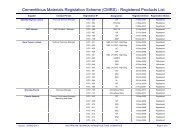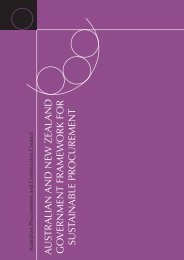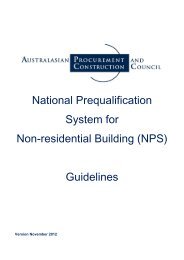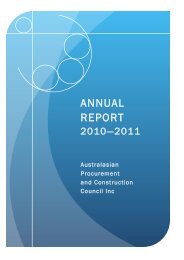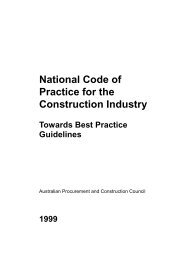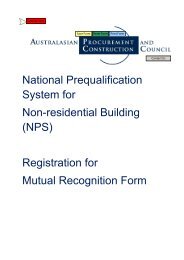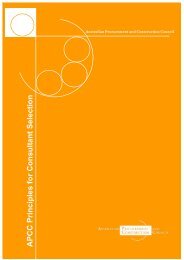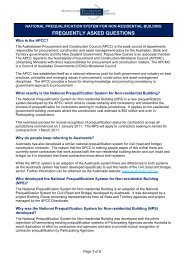Improving Security of Payment Building and Construction Industry
Improving Security of Payment Building and Construction Industry
Improving Security of Payment Building and Construction Industry
- No tags were found...
Create successful ePaper yourself
Turn your PDF publications into a flip-book with our unique Google optimized e-Paper software.
4. Trusts Page 39National Public Works Council Inc<strong>Improving</strong> <strong>Security</strong> <strong>of</strong> <strong>Payment</strong> in the <strong>Building</strong> <strong>and</strong> <strong>Construction</strong> <strong>Industry</strong>4.7.9 Insolvency <strong>of</strong> the TrusteeIt may be that the trustee itself becomes insolvent. What effect this has on thebusiness <strong>of</strong> beneficiaries will depend on the structure <strong>of</strong> the trust.The general equitable principle, however, is that each beneficiary is rated equally <strong>and</strong>funds should be distributed on a pro-rata basis.The implications <strong>of</strong> an insolvent trustee <strong>of</strong> a trust which is not a cascading trust,would have the same effect as if there were an insolvent beneficiary, ie funds willbecome "blocked".Any monies left in trust at the time <strong>of</strong> insolvency can be distributed to the appropriateSubcontractor without amounting to a preferential payment.4.7.10 Tax ImplicationsIt is likely that there will be tax implications arising as a result <strong>of</strong> interest earned ontrust accounts during the term <strong>of</strong> the project. This will necessarily carry with itcertain obligations at law eg accounts, tax returns etc.4.7.11 Educating the TrusteeThere are onerous requirements imposed upon trustees concerning their fiduciaryduties. In particular, the duty to account carries with it a requirement that all moneyheld by the trustee is able to be accounted for. This, in turn, carries with it strictrequirements as to the maintenance <strong>of</strong> accounts.Assuming the trustee is to be an industry participant, he will need to be trained in thearea <strong>of</strong> operating <strong>and</strong> maintaining trust accounts, as well as being required todemonstrate an underst<strong>and</strong>ing <strong>of</strong> the requirements <strong>of</strong> the position <strong>of</strong> trustee.It has been suggested that such a training <strong>and</strong> education requirement may be used t<strong>of</strong>orm the basis <strong>of</strong> a builder's or Subcontractor's licence.This requirement may be obviated if the trustee is an independent third party such asthe State Trustee, or an fund management company as they are already well versedwith the requirements <strong>of</strong> the position.4.7.12 Limitation PeriodThe law currently provides for a variety <strong>of</strong> limitation periods to proceed against atrustee for breach <strong>of</strong> trust, ranging from no prescribed period in the case <strong>of</strong> afraudulent breach <strong>of</strong> trust (except New South Wales where the period is 12 years) tosix years in the case <strong>of</strong> an innocent breach, including a failure to maintain accounts.Because <strong>of</strong> the potential crippling effect <strong>of</strong> a delay in the flow <strong>of</strong> funds down thecontractual chain, such periods provided for under the Statutes may be too long. Ashorter period, perhaps within one year from the date <strong>of</strong> completion, ab<strong>and</strong>onment or


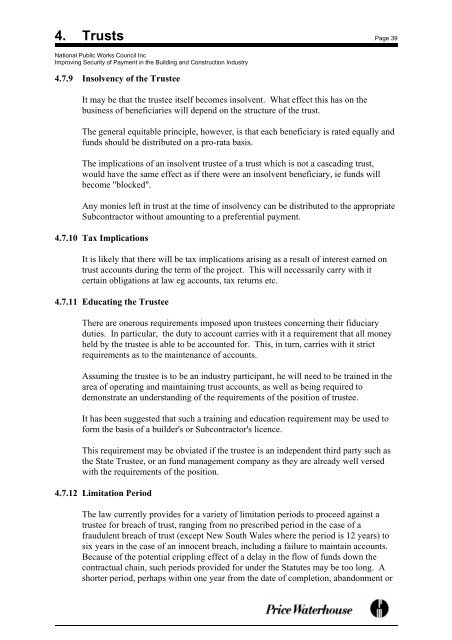
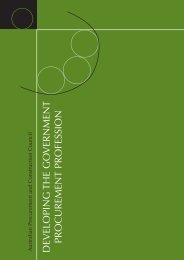
![NATIONAL COST ADJUSTMENT PROVISION EDITION 2 [NCAP2]](https://img.yumpu.com/48266135/1/184x260/national-cost-adjustment-provision-edition-2-ncap2.jpg?quality=85)
